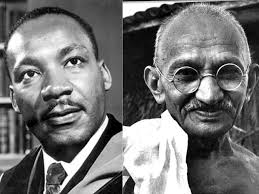How Can I Make Sense of So Many Christian Denominations ?

Are the differences in christian denominations worthy of the separations?
Reply:
Two relevant scriptures come to mind in replying to these very excellent and thought provoking questions. [Philippians 1, 15 and 18] “15 Some indeed preach Christ from envy and rivalry, but others from good will. 18 What then? Only that in every way, whether in pretense or in truth, Christ is proclaimed, and in that I rejoice. (ESV)”
Explanation:
In Philippians 1, the Apostle Paul God is writing to the Philippians from prison and is speaking of his imprisonment and how it’s ensuing impact on both political and religious discussions had resounding to the furtherance of the Gospel of Jesus Christ. Martin Luther King’s “Letter From A Birmingham Jail”, had a similar effect in creating religious, political and social churn  on the reality of the impact of Institutionalized Racism and discrimination against African American in the American culture. Mahatma Gandhi’s and Nelson Mandela’s imprisonments also greatly impacted the social consciousness of the day and created similar social unrest. In each cases the unrest led to some positive results for the cause undertaken and some towards negative results for the same cause, as the Apostle Paul addresses in his letter to the Philippians.
on the reality of the impact of Institutionalized Racism and discrimination against African American in the American culture. Mahatma Gandhi’s and Nelson Mandela’s imprisonments also greatly impacted the social consciousness of the day and created similar social unrest. In each cases the unrest led to some positive results for the cause undertaken and some towards negative results for the same cause, as the Apostle Paul addresses in his letter to the Philippians.
The diaspora of ideas are ported through this world by the sweeping winds of social consciousness, ever-blowing relevant ground-breaking thoughts and concepts; in this case, they carried, God’s Word; the liberating Gospel of our Lord and Savior Jesus Christ and his Great Commission as provided in Matthew 28:16-20. There in Matthew’s written Gospel, Christ commands the eleven (11) remaining Disciples (and readers of the gospel) to “19 Go therefore and make disciples of all nations, baptizing them in the name of the Father and of the Son and of the Holy Spirit, 20 teaching them to observe all that I have commanded you. And behold, I am with you always, to the end of the age. ESV”
Paul is often spoken of as the 12th Disciples. Though Matthias was chosen by the others to replace Judas, it is clear and undisputed that through the manifestations of his works, teaching, writings, preaching and performance of miracles, as well as his actually seeing Christ on the Damascus Road, that he was a true Apostle of Christ. Why am I taking the long road (the Damascus Road) to answer the question… “How is a person to make sense of the so many Christian denominations?
Well, because it is for sure that Paul preached the Gospel of Jesus Christ and it is his own testimony in (Phil. 1:15 and 18) that it divided people into both positive and negative factions. Jesus’ own statement in Luke 12:51-53, concludes that the “True Gospel” preached, will not immediately bring about peace and harmony but will divide people, nations and even families.
“51 Do you think that I have come to give peace on earth? No, I tell you, but rather division. 52 For from now on in one house there will be five divided, three against two and two against three. 53 They will be divided, father against son and son against father, mother against daughter and daughter against mother, mother-in-law against her daughter-in-law and daughter-in-law against mother-in-law. (ESV)”
This division spoken of by Christ, is not only between what some call the “Saints and the Aints”, “the saved and unsaved”, “those who accept the Gospel and those who don’t ”, but there is also division within the two groups. The former division (among the saved) creates the many Christian denominations and the latter division (the unsaved) creates the many different fractured factions who oppose the Gospel from many diverse and various ways, means and dogmas (i.e. secular humanism, atheism, existentialism and the like).
So the battle rages… nations against nations, religions against religions, humanity against humanity and yes, even Christian against Christian, though most often we would like to think the latter is nonexistent. A quick and easy survey of the zeitgeist of the current age and comparative studies of the history of previous eras, will reveal, that people of God were often in opposition to each other (Cain and Abel, Moses’s people and Nathans’s Group in the wilderness, the Northern Kingdom (10 tribes) and the Southern Kingdom (2 tribes) in Ancient Israel, Pharisees and Sadducees, Catholics and Protestants).
This seemingly perpetual condition through the ages leads to the conclusion and the answer to the second part of the question, “Are the differences worthy of the separations?” The answer is yes, because in the separated order of things, Christ grants (Selah) to believers. Yes, a cleft in a rock, a pause, which affords some protection, some solace through the raging battle, that Christ said the advance of “his Gospel”, which means the “preaching of it”, would produce. [Philippians 1:15] “Some indeed preach Christ from envy and rivalry, but others from good will. ESV” In these God predicted and allowed divisions, groupings and separations, those of like mindedness, may share a more kindred path of persecution and a common warfare in this age called the “Church Militant” (while fighting sin, evil principalities, ideas and thoughts), until we all become members of the church called “the Church Triumphant” (enjoying an eternal happiness with God).
Moreover, most Christian denominations hold to a main set of beliefs, which within those core beliefs they share the sweet communion of Christ. That is to say, the denominations share a common fellowship arrived at by a core set of unifying beliefs; while other non-core beliefs may vary between denominations and even between churches within denominations. Foremost, in these core beliefs is professed faith in Christ, activated by God’s Grace and through the saving blood of Christ, as the only means of salvation.
The major areas of what denominations believe (called doctrines) have been well studied through the ages. The most widely accepted doctrines (also called articles of religion) for the “main core of Christian denominations” (if such an adjective is allowed) are 1) the Bible is God’s Word; 2) God Is Three in One (Trinity: Father, Son and Holy Spirit); 3) Jesus Is Fully God (the Son in the Trinity, existing throughout eternity past and present); 4) We Are Saved by Faith in Jesus Christ (saved by grace alone through faith in Jesus Christ); 5) there is Life After Death (and a bodily resurrection).
Other areas of beliefs, say… how baptisms are to be conducted, what are considered the sacraments (holy rites) of the church, and others beliefs vary more widely throughout Christian denominations. But, hopefully they vary around the unifying core truths that we share. But even in that, we commonly see factions within denominations and separations caused by the non-core doctrinal statements of church denominations and also from those of congregational (non-denominational) churches which are on a rise in the US and around the world.
Summary:
The Apostle Paul in Ephesians 4:1-5, sums up the matter in an excellent way. He encourages us to bare one another in a unifying love. “4 I therefore, a prisoner for the Lord, urge you to walk in a manner worthy of the calling to which you have been called, 2 with all humility and gentleness, with patience, bearing with one another in love, 3 eager to maintain the unity of the Spirit in the bond of peace. 4 There is one body and one Spirit—just as you were called to the one hope that belongs to your call— 5 one Lord, one faith, one baptism, 6 one God and Father of all, who is over all and through all and in all. 7 But grace was given to each one of us according to the measure of Christ’s gift.” (ESV)
Please scroll to the bottom to question, comment or testify. We’d love to hear from you.
Recommended Posts

C2 Leadership Fall Cohort 2025 Applications
May 02, 2025
2024 – Vacation Bible School – A Rousing Success!
August 07, 2024
God Sent An Angel For Becky
March 10, 2024

